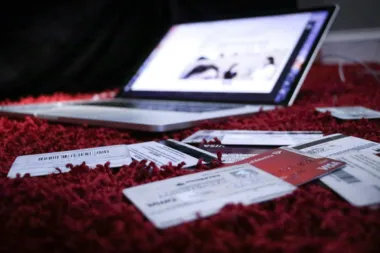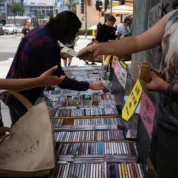
As a musician, it’s only natural for you to want the whole world to listen to the songs you put your heart and soul into creating. And if you’re ambitious and want this to be more than a hobby, it isn’t enough for them to just listen to your music—you also want them to buy it.
While avid music lovers still sometimes pick up physical copies of albums in brick-and-mortar stores, these days, most purchases happen online.
If you want to start selling your own music over the internet but don’t know where to start, look no further. In this article, we’ll go over the best platforms you can use to learn how to sell music online, as well as a few tips to increase your sales.
Where to Sell Music Online

When it comes to earning money from your music, you have three main options:
Streaming Platforms
Technically, monetizing your music on a streaming platform isn’t quite the same as “selling” it, but it’s the first step that many budding artists take.
The most popular streaming services include:
When you upload your music to one of those platforms, you’ll earn royalties whenever people listen to it. However, there’s a small catch—none of those sites allow artists to upload their songs directly. You’ll need to hire a distributor to upload them for you.
The most popular distribution services to consider are:
For a more in depth look at the top distribution services, make sure to read our head to head comparisons of TuneCore vs DistroKid and CD Baby vs DistroKid.
While some of those companies offer free services, including Amuse, most of them cost money (either a one-time fee or a portion of your revenue). Unfortunately, sometimes you have to spend money to make money.
Alternatively, you can upload your music to SoundCloud, which is another very popular streaming platform that also doubles as a distributor. If you spring for a paid account (which you’ll need to earn money from your streams), SoundCloud will also let you distribute your songs to the other platforms.
Most artists don’t earn a ton of money from streams, but this is a good way to expand your fanbase. Moreover, you can link to other websites that sell your music and merchandise from your profile on the streaming sites and apps.
Online Music Stores
Streaming are a good starting place when learning how to sell music online, but if you want to actually sell your songs, you’ll need to upload them to an online music store, too.
Although these websites typically take a cut from your profits (often 15%–30%), they can help you reach a wider audience. Most people who are into music will expect to see your songs on all the major selling platforms.
The most popular digital music stores include:
Bandcamp
iTunes
Amazon Music
(this service sells music in addition to offering streams)Beatport
(primarily sells electronic dance music; aimed at DJs)Traxsource
(primarily sells house music)Juno Download
Note that some of these services (including iTunes) require you to work with a distributor to upload your music. Others, including Bandcamp, allow you to upload your songs on your own.
Generally, when you sell through an online store, you can set your own prices. This is an important step—needless to say, you want to price your music competitively, but you also don’t want to undervalue your time and effort.
To set reasonable prices, consider how much the platform takes per sale and check out how much other artists are charging.
Your Own Website
Creating your own website gives you full autonomy over your personal brand when figuring out how to sell music online. You can present yourself and your music however you like, and what’s more, you get to sell directly to your fans without a middleman.
Selling via your own store probably shouldn’t be your only method, especially in the beginning when you’re still getting your name out there. However, it’s a great way to earn money once you’re established. And you don’t have to create your site from scratch. There are plenty of website builders that you can use, including some that are specifically for musicians.
Some popular website builders are:
Note that these may charge a monthly fee to keep your site up and running, so be sure to check the pricing plan before signing up.
When you set up your online store, don’t limit yourself to just selling digital products (like MP3s). The rise of streaming has made it harder to get people to shell out for those, but lots of true music lovers are still willing to spring for physical products (e.g., CDs and vinyls), both to collect them and because they appreciate the higher quality of uncompressed audio.
Tips to Sell Your Online

The hard truth is that selling music online isn’t just about being a great musician—you also have to market yourself. Try these methods to shine a spotlight on yourself and your songs:
Stay Active on Social Media
As you might already know, social media is a powerful tool for promoting your music and engaging with your fans, and often an initial starting place for many musicians learning how to sell music online. In addition to updating them about your latest releases and events (such as shows), you can engage with them on a more personal level.
For instance, you can:
Post behind-the-scenes content
Upload snippets of your upcoming songs
Host Q&A sessions
Live stream your practice or recording sessions
Interacting with your audience like this will help you build a loyal fanbase and garner new listeners.
As a cherry on top, you can also directly monetize your social media accounts in several ways. For instance, you can make money on YouTube, Instagram, and other platforms through sponsorship deals and affiliate marketing (i.e., recommending products in exchange for a cut of the sales).
Note that even if you don’t have a new single or album to promote at the moment, you should stay active on social media if you intend to keep releasing music in the future. Doing so keeps you in people’s minds and helps you stay relevant.
Creating a Mailing List
In a similar vein, it’s also worth creating a regular mailing list. Some people aren’t particularly active on social media but still check their emails regularly.
To see much benefit from this, you’ll need an existing group of fans who are interested in receiving messages from you and are keen to support your music career. Ask them to sign up for your newsletter on your social media accounts and personal website.
In addition to promoting your music and your live events, consider adding a few personal touches in your emails to make them more meaningful. For example, you can share the music you’ve been enjoying recently and run a giveaway every now and then.
Start a Blog
As you’re probably gathering, marketing yourself when determining how to sell music online mostly boils down to building a relationship with your audience.
If you’re a writer as well as a songwriter, consider adding a music-related blog to your personal website. You can write about whatever you like, but popular topics include:
Your creative process (both the inspiration for your music and the actual act of recording)
Stories from your shows and other live events
Commentary on the music you like and the industry at large
Having a blog will increase your website’s online visibility, which can bring in new listeners. It also gives your existing audience a reason to revisit your site.
If you give this a try, take a few hours to research current SEO best practices so that your blog performs well on search engines like Google. You don’t have to become an expert—just make sure you aren’t accidentally doing anything to sabotage yourself.
Release Singles
Releasing singles steadily in the months leading up to an album launch builds excitement and generates conversations about your new music. Include a pre-order link in the announcement of each new song; giving your fans a taste of what your upcoming music sounds like may motivate them to go ahead and buy it.
Aside from uploading your singles to the online shops and streaming platforms we mentioned above, you can also post lyrics and music videos on your YouTube channel. Here again, don’t forget to add a pre-order link in the description box.
Offer Incentives
Lastly, try coming up with creative incentives to entice people to buy your music. For instance, you can offer exclusive discount codes to fans on your mailing list for a limited time.
You can also adopt a pay-what-you-want pricing model for some of your older songs. While some people will almost certainly pay less than their market value, die-hard fans may voluntarily pay much more, balancing out your revenue. The gesture can also earn you a significant amount of goodwill.
Try creating different product bundles to catch your audience’s attention. For example, you can include a digital download whenever someone buys a CD or a vinyl version of one of your albums, or you can throw in a t-shirt or poster with purchases over a certain dollar amount.
Whatever incentive you come up with when determining how to sell music online, just make sure it’s practical so that you’re still making enough money on each sale. Good luck!







Leave a Reply!